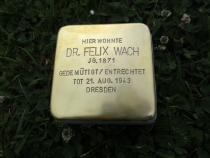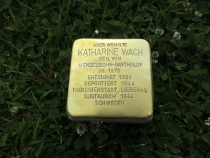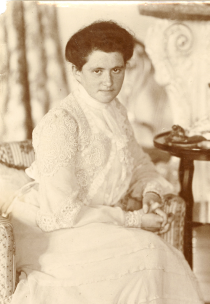Wach family - Laying location: Augustusweg 62
Felix Wach (1871-1943)
as "quarter Jewish"/"Mischling 2nd degree"(>> racist categories according to the Nuremberg Laws)
Stumbling stone inscription:
HERE LIVED
DR. FELIX WACH
YG. 1871
HUMILIATED / DISENFRANCHISED
DEAD 21 AUG. 1943
DRESDEN
Felix Wach was born in Frankfurt am Main on 19 April 1871, the son of law professor and privy councillor Adolph Wach and his wife Fanny Henriette Elisabeth, née Mendelssohn Bartholdy. After attending grammar school, he did one year's voluntary military service and then studied law, including in Lausanne. In 1896, he received his doctorate from the University of Leipzig and began his legal training.
After working as a trainee lawyer and assessor in Rochlitz and Chemnitz, Wach moved to Dresden in 1899. Here he became a Legation Councillor in the Saxon Foreign Ministry in 1900, followed later by positions at the Higher Administrative Court and the Ministry of the Interior. In 1909, he became an Amtshauptmann in Großenhain and from 1914 in Pirna. During the First World War, he served as Rittmeister der Reserve in the Ober-Ost staff and in Lithuania in 1918. He was appointed Privy Councillor in the same year.
Wach was active in society, for example in the Saxon Artists' Aid Association, the Dresden Museum Association and, from 1919, in local politics in Oberlößnitz. After working as a ministerial councillor, he retired in 1929 and travelled to Western Europe and the USA.
In 1897, Felix Wach married his second cousin, Katharine von Mendelssohn-Bartholdy. The marriage produced the children Joachim, Hugo and Susanne, who grew up in Radebeul from 1912. They too were persecuted after 1933 as so-called "half-Jews".
Although Felix Wach was Protestant, he came under increasing pressure because of his ancestry. In 1938, he lost his seat on the supervisory board of the Schipkau-Finsterwalder railway company. His situation worsened due to his complaint about the destruction of the Mendelssohn monument in Leipzig and targeted defamation by the mayor of Radebeul, Heinrich Severit. The attempt to protect the family property failed in 1939.
Felix Wach and his wife had to move to Dresden. He died on 14 September 1943 in his flat at 27 Karcherallee.
Text: D. Ristau
Katharine Wach (1876-1956)
Persecuted as "Jewish"
Stumbling stone inscription:
HERE LIVED
KATHARINE WACH
FED. FROM
MENDELSSOHN-BARTHOLDY
BORN. 1876
DEPORTED 1939
DEPORTED 1944
THERESIENSTADT / LIEBENAU
'EXCHANGE' 1944
SWEDEN
Katharine Marie Albertine Wach, known as Käthe, was born in Berlin on 24 September 1876, the daughter of Privy Councillor of Commerce Ernst Moses Felix and Maria Alexandrine von Mendelssohn-Bartholdy. According to the conventions of her time, she ran a middle-class home, especially after settling in Radebeul, where she owned the property at what is now Augustusweg 62.
Due to her Jewish ancestry, Katharine Wach faced increasing persecution from 1933 onwards, even though her marriage to her husband Felix initially offered a certain degree of protection. Her history of persecution cannot be reconstructed in full detail due to incomplete sources. In 1939, she experienced the de facto expropriation of Villa Wach, which was converted into the National Leadership School of the German Red Cross. She had already been forced to adopt the compulsory first name "Sara".
In an effort to improve their status, the couple travelled to the USA in 1938 and in 1939 Katharine Wach acquired Cuban citizenship, which later became crucial for her survival.
After the death of her husband in 1943, she lost her last protection. In January 1944, Katharine Wach was arrested by the Gestapo and deported to the Theresienstadt ghetto on 10/11 January. Due to her Cuban citizenship, she was transferred to the Liebenau internment camp on Lake Constance at the beginning of March 1944. In June 1944, she was transferred to the Reich Main Security Office in Berlin, from where she was released to Sweden as part of a so-called "individual exchange".
After the end of the war, Katharine Wach moved to Switzerland, where relatives lived. She died on 27 July 1956 in Orselina and was buried in the cemetery in Gsteigwiler.
Text: D. Ristau







